Now that you’re going to become an author, you’ll have to deal with all the fears and anxieties that come with writing.
You’re not alone. All authors start where you are right now. We start insecure, unsure, and afraid. We start with fear, and sometimes even terror, gripping us.
And sadly, for some authors, these fears stop them from ever writing their book at all.
I’ve been writing professionally for fifteen years, and the fears I’m about to detail are the same ones I’ve had to deal with in the past (and still deal with on a day-to-day basis).
This post will detail the common author fears, explain how they are destructive to books, and provide insight into how you can reframe those fears to help you. You may not have every one of the six I list below, but chances are you will deal with at least four at some point in the process.
Fear #1: “I don’t have a book in me.”
Fear #2: “I’m afraid my book isn’t original enough.”
Fear #3: “I’m afraid my book won’t be good enough.”
Fear #4: “I’m afraid no one will care about my book.”
Fear #5: “I’m afraid my book will upset people.”
Fear #6: “I’m afraid my book will make me look stupid.”
Fear: “I don’t have a book in me.”
Alternate Expressions of This Fear:
“I’m afraid there’s no book in me.”
“I’m afraid I don’t have anything to say.”
“What if I’m not an author?”
“Who am I to write a book?”
How This Fear Will Impact Your Book
It’s very common for an author to be afraid that they don’t have the knowledge in them to write a book. Or even worse, that they don’t deserve to be an author.
For most people, this is a version of what’s referred to as Imposter Syndrome.
Imposter Syndrome is when someone—even a very accomplished person with a lot of experience and credentials—believes they don’t actually know what everyone thinks they know. They believe their ideas are either wrong or invalid, or that everyone already knows what they know. People with Imposter Syndrome have this idea in their heads that everyone else has it figured out, but they are the imposter.
In the most extreme cases, Imposter Syndrome is when authors feel that their book will expose them as frauds or as fakers.
Example of an Author with This Fear:
We worked with a consultant, Jonathan Dison, on his book, The Consulting Economy. He’s a management consultant, who had his own consulting firm that was doing very well. Hundreds of people he’d worked with throughout the years had asked him to write a book, one that would detail the method he used to help them transition from corporate employee to independent consultant.
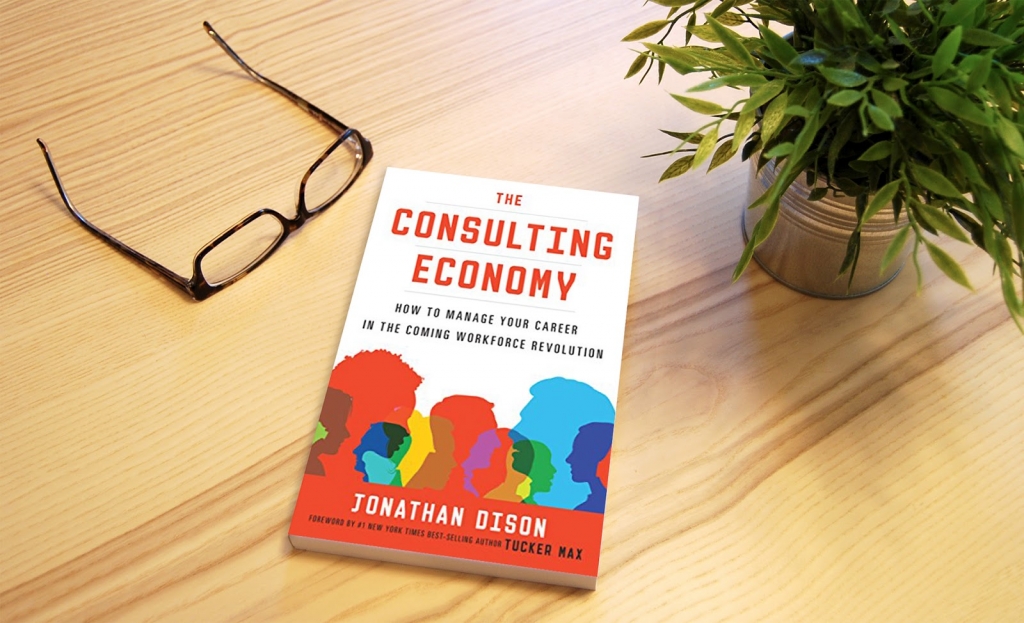
Despite all these people asking him for the book, he put it off because he didn’t believe he was enough of an expert to write a book. Even though he literally made the life-changing transition himself, and had coached hundreds of people through it—at some level he didn’t believe he actually knew anything.
I can’t tell you how many times Jonathan said, “Tucker, I have no idea what I’m doing.”
I would then walk him through how he helped people transition from corporate employee to independent consultant. I had him explain his process to me, and then tell me about the people he’d helped, and have him tell me what they told him about his advice (always gushing praise).
I know, it’s funny to laugh at this from a distance, even Jonathan laughs at it now, but this was a real issue for him when he was beginning his book.
That’s what’s so great about this fear—it’s usually easy to understand if it’s based in reality. Just ask yourself: are people coming to you and asking you for, or paying you for, your knowledge?
If so, then you clearly have a book in you, as long as the book is just you sharing that knowledge with people. You can overcome your Imposter Syndrome by focusing on that fact alone.
Fear: “I’m afraid my book isn’t original enough.”
Alternate Expressions of This Fear:
“I don’t think I have anything new to say.”
“Everything I have to say is stuff everyone already knows.”
“I’m afraid this has all already been said.”
“My book won’t be any different from other books on this topic.”
How This Fear Will Impact Your Book:
The funny thing with Jonathan Dison (from the example above) is that once he admitted that he knew something, he’d say, “But this is obvious, no one needs to be told this!”
This is a common feeling. And it’s almost always wrong.
Many authors have the idea that a valid book must have a new insight that no one has ever considered.
That’s ridiculous. Very few books are profoundly original—and the few that are tend not to be that valuable (because true originality demands that the idea be far too esoteric to be useful for most people).
A book is valuable if the knowledge within it is accessible and usable to the audience.
If you can write a book on a deeply covered topic, providing a unique perspective that sheds new light on the subject and helps your audience understand something they were missing, that is very valuable.
Even if you feel you don’t have a brand new perspective on the subject, if you have a unique voice and perspective around key concepts, tailored for your audience, and can curate old ideas in a new way, you will help them see old concepts in a way that finally clicks for them.
No reader cares if the idea is new or old. They only care if it’s USEFUL TO THEM.
Example of an Author with This Fear:
My favorite example of this is Meetings Suck by Cameron Herold.
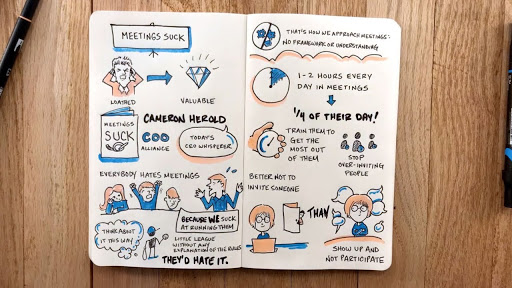
How many business books are there on meetings? According to Amazon, there are 50,000.
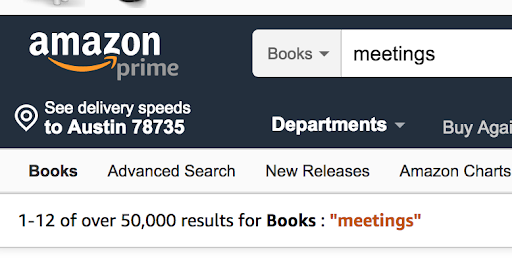
Surely if there was one book that did not need to be written, it was this one, right?
That’s what Cameron thought at first.
We walked through what he knew, and helped him realize that though his methodology for meetings had no single insight that was truly original, the way that he combined all his insights and presented a complete plan for how to run a meeting was deeply useful to everyone he coached and taught.
With 105 reviews and 45,000 copies sold, it’s obvious that his take is engaging with people in a way that none of the other books on meetings have.
That’s why Meetings Suck has done so well—because it explained a lot of old ideas in a way that no one else had before.
This is a key aspect of the Scribe Method (which we’ll get into in detail soon). We have our Authors look deeply at who derives value from their knowledge, which helps the Author define their audience. Once they know their audience, they can then think, “What did I teach those people that they found valuable to their lives?” This will force you to clearly define your audience and the value that you are providing to them, thus ensuring that your fear doesn’t come true.
Fear: “I’m afraid my book won’t be good enough.”
Alternate Expressions of This Fear:
“I’m afraid my book won’t be perfect.”
“I’m afraid I put too much in.”
“I’m afraid I didn’t put in enough.”
“I’m afraid I’m going to forget everything I want to say.”
“I’m afraid of leaving things out.”
How This Fear Will Impact Your Book:
This fear is almost always perfectionism. How is perfectionism related to fear?
As the author dives into the book, they become obsessed with every detail. They fret over every word, every punctuation mark, and every phrasing.
Books can get stuck here in various ways:
- The author will try to put everything they know into the book, and this causes the book to bloat and become unmanageable.
- The author won’t stick to a subject and will jump around to different ideas.
- The author’s perfectionism becomes an excuse to delay or avoid actually working on the book.
- The author edits and adds content in never-ending cycles, spinning in circles and never actually finishing the book.
This is not about trying to make the book as good as possible. Excessive obsession with every detail—beyond the point of reason—is a way of masking a fear that the book is not good enough. Authors will get stuck in one of the perfectionism rabbit holes so they can avoid publishing the book.
Example of an Author with This Fear:
Deb Gabor is a great example of this. Deb is a brilliant brand strategist. She’s worked with companies like Dell, NBC, and Microsoft on their branding strategy, and she wrote a book called Branding Is Sex about how companies can use branding in new and innovative ways.
She started the book confident in her knowledge and the value of the book to her readers. But as she moved further into the writing process, insecurity took hold. She wondered if anyone would find it valuable, and to compensate, she put more and more information into it.
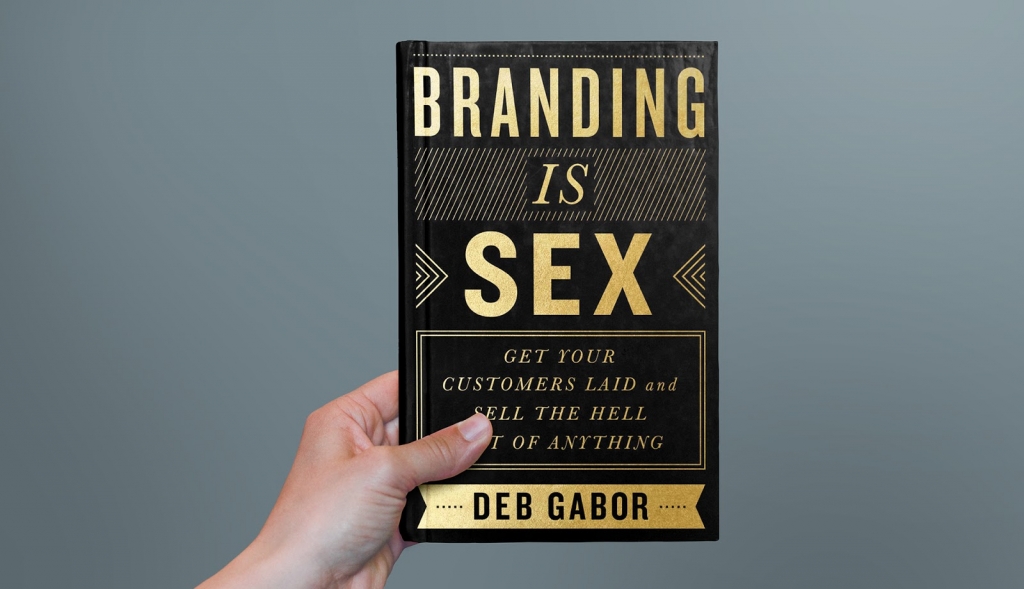
As a result, the book, without any conscious intent, became far too big and unwieldy. Because she was trying to put everything she knew into the book, instead of just focusing on what her audience valued and wanted to know, she ended up with a book that was way too long. In order to compensate for her insecurity, she turned to perfectionism, and it almost ruined her book.
Thankfully, Deb is smart and self-aware, and once we walked her through what she was doing, she recognized it and was able to get her book re-focused and sharply defined.
Another thing we explained to Deb is the saying that “art is never done, it’s only abandoned.” The point is that being perfect is literally impossible. All you can do is the very best job you can right now, and then put it out to help your audience, and you’re done.
That’s the good thing about this fear: it forces you to define both your audience’s needs very specifically, and how your book meets them. By using this fear productively, you force yourself to focus exclusively on the audience and what they want—and stop thinking about yourself, and how you look.
This enables you to write a better book, one that gives the audience what they are looking for, and thus gets you what you want.
Fear: “I’m afraid no one will care about my book.”
Alternate Expressions of This Fear:
“What if no one reads it?”
“What if there is no audience?”
“What if my book doesn’t impact anyone?”
“What if this is a waste of my time and effort?”
“I’ll be embarrassed if people criticize my book.”
How This Fear Will Impact Your Book:
This is a pretty simple fear, and it generally comes up in people who are trying to find a way to avoid other deeper fears (like the “looking stupid” fear, covered below). Usually, this fear manifests by an author convincing themselves that no one will care about their book.
Paradoxically, this is almost always suffered by the authors who have the books that are most impactful on others (the authors who should worry about this, almost never do—such is life, right?).
Example of an Author with This Fear:
Dr. Douglas Brackmann grew up with ADHD and was told his whole life that he has a disability. He refused to see it that way. He spent his life seeking to understand where ADHD comes from (it’s actually genetic and serves an adaptive purpose) and how to utilize the energy and focus the condition creates to improve his life.
He solved this issue in his life, and then started training the highest performers—entrepreneurs, CEOs, pro athletes, inventors, and Navy SEALs—to learn how to perform even better using the techniques he had to learn to compensate for his ADHD.
But when it came time to write a book, he wasn’t sure anyone would care.
Think about that for a second: he was ALREADY training some of the highest performers in the world, but he still wasn’t sure that anyone would care about his book?
This sort of thing happens because when an author knows their subject so well, they often think it’s obvious or easy, and so they discount their knowledge. They forget that the exact people they’re writing for do not have this knowledge—and are often desperate for it.
In Dr. Brackmann’s case, this happened. Look at the Amazon Reviews:
“The tools that Dr. Brackmann gave me, all of which you will find in his book, allowed me to find inner peace and happiness and realize my true potential…I could recognize my soul again, lift myself up and design the life I had always dreamed of. Dr. Brackmann helped me understand how my mind worked and helped me harness the Driven characteristics I had so that in less than 1 year I could build a 7 figure business with no outside help, find the girl of my dreams, and pursue a life of mastery in many different areas. I highly recommend this book for anyone that has a desire to find more peace while fulfilling their potential.”
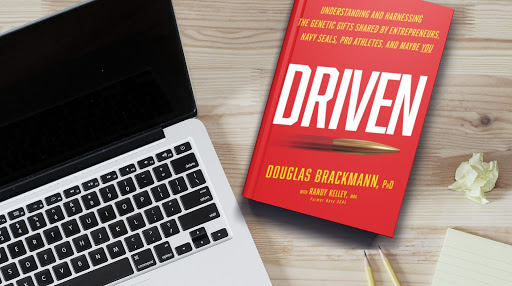
This fear can turn into motivation if you use it right. If you’re afraid no one will care, then find someone in real life who does care about what you have to say, teach them what you know, and then look at the transformation in their life.
If you can see that, see the impact it makes on them, then it should be much easier to finish your book, because it’s no longer about you—it’s about them and other people like them.
Fear: “I’m afraid my book will upset people.”
Alternate Expressions of This Fear:
“I’m afraid this book is going to make someone mad.”
“I’m afraid of being judged.”
“I don’t want my book to upset my current clients.”
“I can’t say these things about people.”
“What if my friends read it and hate it?”
“What if I sound bitchy?”
How This Fear Will Impact Your Book:
This fear is a major book killer. The fear of judgment is crippling to many authors, and prevents them from either writing their book, or from writing the book that they really want to write, or telling the stories they want to tell in their book.
Here’s the simple fact about books: if no one at all disagrees with what you are saying, then you aren’t saying anything worth putting in a book.
If I wrote a book about how the sky is blue, why would anyone care? Everyone already knows that. A book should make new claims, or reframe old information, or take a position that stands in opposition to conventional wisdom, or teach something new or different or contrary.
That’s the entire point of a book—to help people find a new way to think about something or do something.
Let me say it again: It’s impossible to write a good book without taking some kind of risk, and saying something that someone, somewhere, might disagree with.
Example of an Author with This Fear:
Shannon Miles is a great example of this. Shannon wrote The Third Option, a book that explains how women do not have to choose between a career and a family, that they can actually create a life that gives them both.
There are many women who will claim that a woman’s career should come first, and many others who will say family must come first. Shannon took the position that neither is true, that you can have both—which is upsetting to both sides.
Because Shannon knew that she was going to be heavily criticized and attacked from both sides, she hesitated about whether to write her book at all. Once she made the decision to move forward, she still found herself censoring her views and holding back.
Eventually Shannon got past this worry. She focused not on herself, but on her reader, and realized that by withholding her views or stories, she was not serving them, she was failing them—and betraying herself.
As a result, she wrote a book that has been extraordinarily well-received. She did get some negative feedback of course, but it was overwhelmed by all the positive response and thanks from women who felt like she understood and spoke to them in a way no one else had.
It’s OK to admit you feel bad when people say bad things about you. Even if what they say is wrong and unfair, and even if they are straight up lying about you—that still hurts.
It’s OK to admit it, and it’s OK to feel all the terrible feelings that come with that. The human brain is designed such that it interprets social violence almost exactly the same as physical violence. It hurts when people attack you, and I will never tell you to block it out and pretend it doesn’t bother you. That doesn’t work.
But, if this is a fear you are facing, you have the option to see it as a gift.
If there are people who will criticize your position, that can force you to examine it from all angles and make sure your arguments are rock solid.
Also, opposition helps you find and galvanize your own audience of people, like Shannon did. If there are loud and angry people on only one side of a debate, it probably means the other side simply does not have a spokesperson. Your book puts you in that role.
Also, use this fear to make sure you are being fair to people and other arguments. It’s okay to be conscious about the words you use and how they impact people. This does not mean you water down your position—in fact, your argument is strengthened when it is considerate of alternate viewpoints.
Finally, remember the iconic quote about this by Steven Pressfield:
“Making a judgment, taking a stand and then acting against an injustice or acting to support excellence is the stuff of the everyman hero. If you are an aspiring artist and you wish to avoid ‘judgments,’ you’ll find that you have nothing to say.”
—Steven Pressfield
Fear: “I’m afraid my book will make me look stupid.”
Alternate Expressions of This Fear:
“I’m afraid I’m going to look stupid.”
“What if I get all one-star reviews?”
“What if everyone who reads it, hates it?”
“What will people think if there’s a typo?”
“I’m afraid something will be wrong with my book, and I’ll look stupid to everyone I know.”
How This Fear Will Impact Your Book:
The biggest unspoken fear that I believe (virtually) every author has is that they will embarrass themselves. I saved this for last because almost every fear above boils down to this one.
This fear is very rational. For many professionals, writing a bad book is actually worse than writing no book at all. This is because for someone with a certain level of status, a bad book will hurt their career.
For others, it goes even further. For some, the book is very attached to their identity. They see the book as an extension of themselves, and they are worried that if the book isn’t well-received, then it means they will personally look bad. No one wants to look flawed to their peers, especially with something as personal as a book.
This fear can get so bad, people will literally forgo the tens of thousands of dollars they pay us to help them write a book—all because they’re afraid to hit the final “publish my book” button.
I’m not exaggerating at all. We have authors who will work for months, do all the difficult editing and revisions, go through the entire publishing process, and then, when there is literally nothing left to do besides give the final approval, will completely ghost on us.
They can’t face their fear that the book isn’t good, so they avoid even talking about it.
Example of an Author with This Fear:
Every author we’ve ever worked with—without exception—has had some version of this fear (and I’ve had this fear as well).
Joey Coleman is my favorite example. He even wrote about his fear in his book, Never Lose a Customer Again:
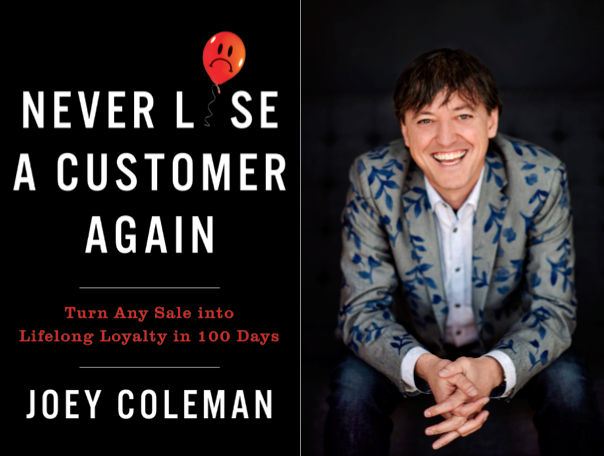
“But not long after that, I started to doubt myself and I began to question my decision to write a book.
Did I really have a good enough message that could carry an entire book?
Would the readers find as much value in the eight-phase process as my clients had over the last twenty years?
Would I be able to explain all the nuances of the framework properly in three hundred pages?
Was I going to make myself look stupid?
As these thoughts of fear, doubt, and uncertainty flooded my mind, I grew distant. I started rescheduling planned phone calls with the team, pushing them off for both real and fabricated reasons alike. I used any excuse I could think of that would allow me to delay the next step in the process.
This went on for several months until one night, when my cell phone rang unexpectedly. The caller ID indicated it was Tucker’s cellphone, and a quick mental scan of my calendar let me know this was an unexpected call. I decided to answer anyway.
Tucker got me to open up, admit that I was having feelings of remorse and regret, and assured me that the emotions I was feeling were natural for any author. He told me a story about how he felt the same way when he released his first major book, which ironically enough went on to be a New York Times bestseller, selling more than a million copies worldwide since its release.
Tucker helped me see that I did indeed have a book in me and that he believed it would be valuable to many people. He persuaded me to trust the process, come back into the fold, and continue the work. That is how powerful buyer’s remorse is.
Even though I deeply understood the perils of the cognitive dissonance that marks this feeling, even though I teach this to companies, I could not separate myself from these emotions when I was in that position.
Oops—I’m human too.”
Remember how I told you that fear is not in and of itself a bad thing? If you allow the fear to focus you and become the motivation to focus and work hard, then it can help you. It can be fuel. It can help ensure you do everything necessary to create the best book possible.
But what about when that fear becomes overwhelming? When it seems like your fear—any of these fears—is too much? What then?
The Purpose of Fear
The first thing to remember about fear is that it’s not necessarily bad. Fear serves a purpose.
On a primal level, fear is an adaptive response that helps us survive by motivating us to protect ourselves from danger. It is both natural and helpful in many cases. You evolved to fear things that can hurt you, and fear works to help keep you safe.
The problem with fear is when you let small or irrational fears stop you from doing something you should be doing. Then fear is destructive, not protective.
Some of the fears you face will make sense, while others will seem ridiculous if you rationally analyze them. That’s normal. Fears aren’t always rational (nor are they intended to be).
Don’t shame yourself if you feel any of the fears listed, even if you think they are irrational. Even if they are irrational, the feeling of fear is still real, and you have to address it in order to move forward with your book.
Don’t beat yourself up if fear is holding you back. It’s beaten me before, as it’s beaten almost every author at some point or another.
How To Beat Your Fears
You can win this fight against fear. How do you do it? And, even more importantly, how do you prevent this fear in the future?
You train your emotional brain to reframe the fear you feel and then use it as fuel to action, instead of inaction.
I’m going to show you the specific, step-by-step method we use to help our authors overcome their fear, but first, let’s actually reframe what fear is.
These are the symptoms of anxiety:
- Heart rate raises (adrenaline increase)
- Fight or flight response kicks in, you get jittery, break out into a cold sweat (cortisol surge)
- You have tunnel-vision, can’t see or think beyond your fear (norepinephrine increase)
These are the symptoms of excitement:
- Heart rate raises (adrenaline increase)
- Fight or flight response kicks in, you get jittery, break out into a cold sweat (cortisol surge)
- You have tunnel-vision, can’t see or think beyond your excitement (norepinephrine increase)
Fear is excitement…with a negative frame.
Excitement is fear…with a positive frame.
Think of a rollercoaster. Some people will spend hundreds of dollars and hours waiting in line to ride the scariest one they can find.
Other people will have a panic attack at the thought of going on one.
Same ride. Just a different frame.
Now are you starting to see how to beat your fear?
Here’s the steps to use to do it:
Step 1: List all your fears
Ask yourself, what are you afraid might happen if you write a book? Write down the fears you are feeling. Write down every fear or anxiety.
Don’t run from, deny, or minimize your fears.
Really take a moment and pause to think about ALL your fears. Recognize them, acknowledge them, and identify them.
Don’t worry if this list is long. It should have at least a few fears, and if it has a bunch, then so be it. In fact, the more you list (that are true), the better. That means you are being honest with yourself.
Step 2: Ask yourself, “Is this possible?”
For each fear, ask yourself: “Is this fear possible? Is there any chance it will come to pass?”
Many times people are anxious about vague and undefined fears. If that’s the case, forcing yourself to name the fear and realize it’s not even possible at all can make it go away.
For example, we have authors who work with us that say, “I’m afraid that I’ll write this book but that I won’t be able to get it published.” That’s not a realistic fear. They’ve paid us to do the publishing, we are going to do it.
This being said, most fears will be possible, even if only a small possibility. For example, continuing with the above example, you could say instead, “I’m afraid that I’ll write this book, and I will look bad, and it will hurt my professional reputation.”
That’s a real fear with real consequences—if you write a bad book, you will look bad. Yes, it is highly unlikely that the book will be bad, but it is possible.
For fears that are impossible, disregard and cross them off the list. For the ones that could possibly come to pass, keep going.
Step 3: Ask yourself, “If this fear came to pass, what would the consequences be?”
It’s okay to think of the worst-case scenario here. In fact, it’s preferable. If you articulate the worst thing that could happen, then you at least know what it is and can now move forward with a clear understanding of what there is to lose.
There is nothing wrong with this—being realistic is a big part of defeating fear, so write down what the consequences are.
For some of the fears, the consequences will be minor. For example, if the fear is “I’m afraid I sound bitchy,” the consequences of that are probably benign.
For other fears, the consequences could be larger. For example, if the fear is, “I’m afraid that I’ll write this book, and I will look bad, and it will hurt my professional reputation,” the consequences might be substantial.
And don’t shortchange the impact of the consequence. If you are afraid of something like this happening: “I will write a bad book and people will think I’m stupid and my company will fail and I’ll be a joke and go broke. I’ll lose my house and my family, and I’ll go hungry and die cold and alone on the streets,” then write it out.
Whatever you fear the consequences might be, write them down.
Step 4: Ask yourself, “When I write my book, what benefit will I get for myself?”
You could say, “If I write my book, then I will increase my authority and visibility in my field, get more speaking gigs, and be able to grow my business.”
(Note: you’re going to specifically define these benefits as the very next part of the process, but put something down now, even if you come back and refine them later.)
Then speak these benefits out loud, making sure to frame yourself as excited about them.
Literally say, “YOU should be excited, because this book will get YOU increased authority, additional speaking, and a bigger business.”
Do it three times.
And you MUST say it OUT LOUD. And you make sure to phrase it as you talking to yourself.
I know, this sounds hokey, but saying it out loud has a very different impact on you than just thinking it. Without going too deep into the psychological explanation, saying it out loud makes it more real to your brain.
(If you want to know why saying this out loud makes such a difference, Google “inner speech of behavioral regulation” or “Von Restorff effect.” Warning: these will take you down a serious rabbit hole.)
Step 5: Ask yourself, “Who’s helped by your book, and what do they get?”
Did you notice a trend with the fears you mentioned? What did they all have in common?
It’s actually pretty simple: All fear is selfish.
When you’re afraid, you are focused only on yourself and your own needs. Fear puts you into survival mode. Fear makes it impossible to see outside of yourself. Fear traps you inside yourself.
I don’t mean this to say selfishness is bad. It’s not. Like fear, selfishness has its place in your life. I say this to help you refocus on a main reason you probably want to write your book: to give something back, and make an impact on other people.
Imagine the person you will be helping. Think of them very specifically. Imagine the pain they are in now. Feel the suffering they have because they haven’t read your book.
How much of a difference will your knowledge make in their lives?
Your book is important to them. It matters to their lives. That’s why you are writing it. They need your book.
Think about how much they need the knowledge you have. Imagine your audience after they’ve read your book. What will their lives be like then? How much better will they be because of your book?
Connect with that feeling. Can you do it—for them?
You want to write your book to help other people solve a problem that you used to have, one that’s very painful to you. Helping those people is a big part of your motivation. And picturing those people in need, and you letting them down if you do not write your book, is a very powerful motivator.
Using this motivation turns out to be the ultimate fear-buster: most people who can’t be courageous for themselves can easily be courageous for other people.
And of course, if you just think about who your book is intended to help, you can focus on them. And if you do that—if you focus on the reader—you will actually end up looking good.
Step 6: Ask yourself, “What if I just quit?”
Ask yourself, “If I do NOT write my book, what will happen? Who will suffer, and how?” and write down everything that happens if you quit the book.
This is about using your anxiety against itself. If you ask yourself these questions, often your brain reverses itself, and begins to argue for writing the book.
This works because of the peculiar way that human brains work. Now that you have “seen” the benefits you can get from writing a book, picturing yourself quitting will trigger one of the strongest psychological reactions in humans: loss aversion.
Once you imagine yourself with all these benefits, and then you imagine yourself losing them—things shift in your brain. Your fear doesn’t necessarily go away. It just takes a backseat to loss aversion.
This is one of the most replicated findings in social science; people are far more motivated by losing something than by gaining something. By already picturing yourself with benefits and gains, you now want to keep them.
Step 7: Make Your Decision
This step is very simple: review everything you’ve written so far, and then decide: are you going to move forward with your book? Is it worth it?
Make no mistake, this is a decision, and it is NOT assumed or automatic that you should write the book. In fact, there are plenty of times people look at their lists and realize that the risks of the potential consequences outweigh the benefits, and they decide not to do the book. And that is fine.
In the Guided Author Workshops we run, I have people literally read the major parts of each step out loud, and then either commit or not out loud, in front of the entire group. It works really well as a way to take this out of your head and make it real.
I mean it, you really should say your decision out loud. When you say it and hear it, it makes it different.
Step 8: Ask yourself, “What’s the plan to avoid these consequences?”
Now that you have committed to your book, to move past your fear, you need to lay out precisely what the plan is to avoid or minimize the consequences.
This is because fears often partly originate from a subconscious reaction to a poor plan, or a lack of a plan (this is also where procrastination comes from).
For example, if the fear is: “I’m afraid that I’ll write this book, and I will look bad, and it will hurt my professional reputation,” it’s highly likely that fear comes from, in part, the fact that you’re not confident in your writing skills and don’t yet have a clear idea of who will help you edit your book. The plan might be as simple as having a professional editor and two colleagues review the manuscript before you decide to publish it, to make sure you look good.
You may have to come back and fill in parts of this section later, and that’s okay. For example, if the fear is, “I’m afraid I won’t have time to write the book,” well, right now you don’t have a plan to make time to write the book (we get to that part of the plan later).
But don’t worry—by the time you finish this book, you will have a specific, detailed, actionable plan, so you can know for certain that if you follow it, you’ll get your book done.
Step 9: Ask yourself, “How can I use this fear to help me?”
Fear can actually help you, if you take the right perspective on it.
Remember the rollercoaster example. You cannot choose your physiological response to a rollercoaster, but with some practice, you CAN choose how you interpret that physiological response. Your subjective experience can be “afraid” or “thrilled,” but the body treats the physical response the same.
This means you can reframe fear into excitement, and retrain your brain to not be afraid of writing your book—and in fact to harness that energy to help you write your book.
Now look at each fear you wrote, and ask, “How can I use this fear to help me?”
For example, if the fear is “I’m afraid that I’ll write this book, and I will look bad, and it will hurt my professional reputation,” then you can use the energy of that fear to motivate you to put in the work to do a really good book—to ensure that you do not look bad.
This is possible for each fear. Every fear has the seeds of its solution in it, if you can find them and use them.


